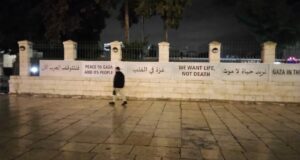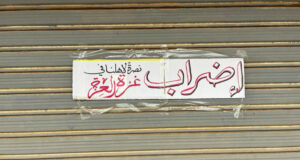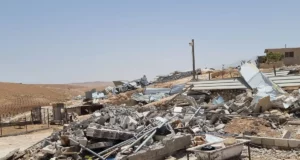By Mustafa Qadri
To view original article, published by the Guardian on the 18th June, click here
Last week the BBC carried video footage of a Jewish settler attack on Palestinian farmers in the West Bank. The attack was filmed thanks to a video advocacy project arranged by the Israeli human rights organisation B’Tselem. The aim of the project is to empower Palestinian families and increase public awareness of their harassment. The over 100 cameras distributed by B’Tselem give Palestinian communities the opportunity to document attacks by Israeli soldiers and settlers in a medium that is less likely to be ignored or disputed by Israeli authorities than oral testimony.
The video depicts three people, an old couple and their nephew, being lynched by four youths near the village of Susia, south of Hebron. The BBC should be applauded for giving the story major coverage on its World News service. Jewish settler violence towards Palestinians is widespread but is rarely given widespread media coverage.
The attack represents a microcosm of Palestinian dispossession in the West Bank. Indeed the village is a story of dispossession and violence in itself. The people of Susia used to live in a number of ancient cave dwellings, one of the oldest and most unique habitats in the region. In 1986 they were evicted by the Israeli army to make way for a Jewish settlement. They managed to hold on to some of the cave dwellings in the outskirts of the town but that was only a temporary reprieve. “In 1997 I went to register our land [with the Israeli authorities],” recalls the farmer Muhammed Nawaja, “but they refused saying we were not allowed. They did not give any reason.” In 2001 Israeli authorities ordered the demolition of these remaining dwellings.
Such acts are not out of the ordinary. According to a United Nations report last year, Israel denies permission to 94% of Palestinian structures in areas of the West Bank under its full control like Susia. Israel has full control of around 64% of the West Bank. Dwellings not authorised by Israel are liable to be demolished at any time.
As I saw with my own eyes three weeks ago, Susia is now a collection of tents and partially-built structures surrounded on three sides by Israeli settlements and a military outpost. Where once there were 800 families living in Susia, today there are only 26 left. From time to time even these humble dwellings are at risk. At one point in the summer of 2001 the villagers were forced to live under trees for four months after their tents were destroyed. They were eventually replaced by the Red Cross although there is lingering uncertainty as to their continued presence. Settlers frequently set fire to crops and the tents, particularly on Friday and Saturday after Sabbath prayers.
So far, the Israeli authorities have appeared unwilling to investigate settler violence. There are now reports from Israel that two youths have been arrested in relation to the attack documented in the video. If they are prosecuted it will be the first of its kind in the Susia region. Villagers in Susia say that settlers shot dead two elderly farmers after their eviction in 1986 and routinely harass others. According to B’Tselem, no one from the settlements has ever been convicted for those murders or attacks.
Despite their indifference towards the Palestinian population, Israeli police and military forces provide 24-hour protection to every Jewish settlement. After I witnessed a clash between settlers and Palestinian villagers at at-Tuwani, a Palestinian village close to Susia, two Israeli army jeeps arrived within 10 minutes. The soldiers duly confronted the Palestinian community and ignored the settlers who continued to hurl abuse.
Most Palestinian men in the region have been detained at some point in their adult lives, often merely for not possessing a valid ID card or on the suspicion that they were involved in clashes with settlers. While Israeli law allows settlers to carry weapons, and it is not uncommon to see teenage settler boys carrying M-16s, Palestinians are forbidden from carrying even rudimentary weapons such as knives or clubs.
The BBC report finally exposes the everyday violence many Palestinians face. Sadly, however, it is but the tip of the iceberg.
 International Solidarity Movement Nonviolence. Justice. Freedom.
International Solidarity Movement Nonviolence. Justice. Freedom.


